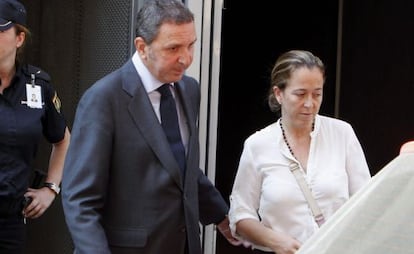Spanish Tax Office turned up major irregularities in failed firm Gowex
Investigation into company also discovered massive diversion of funds to accounts in Costa Rica

The Spanish Tax Office opened an investigation into failed free wi-fi firm Gowex in February 2013, to check on company tax and VAT paid during the years 2008 to 2010. It has now emerged that investigators found a number of irregularities and spent more than a year examining the company’s books.
Spanish company Gowex is currently immersed in bankruptcy proceedings, after its founder and chief executive, disgraced businessman Jenaro García, admitted last month that the findings in an analysis report were true, and that he had been cooking the company books for years.
The Tax Office investigation turned up “alleged continuous financial crimes at Gowex,” according to a report that was sent to the anti-corruption prosecutor on July 10, and to which EL PAÍS has had access.
Florencia Maté, García’s wife, traveled to her native Costa Rica shortly after the scandal broke
The document, which was handed over four days before Jenaro García appeared in court to testify before a judge, also reported a “massive” and unjustified diversion of funds to “hidden accounts” in Costa Rica, the home country of Florencia Maté, García’s wife. Maté traveled to Costa Rica shortly after the scandal broke.
“In 2010, massive amounts of funds surfaced in Costa Rica. In total, the amount deposited in those accounts during that tax year, attributed by Let’s Gowex to client charges, totaled €12,104,796, while withdrawals were as high as €4,295,288.” This, the report continued, suggested the “possible existence of income that had been hidden from the Tax Office.”
The Tax Office also reported that Gowex “holds safe-deposit boxes that were available for depositing cash until it was transferred to Costa Rica in the name of Let’s Gowex, or another account held abroad that benefited the initial stakeholders.”
The accounts in the Central American country were “hidden in the balance sheets of Gowex Wireless”
The inspectors took nine months to discover the accounts in the Central American country, they reported, given that they were “hidden in the balance sheets of Gowex Wireless,” one of the firm’s affiliate companies.
The Tax Office also detected “presumed falsification of part of its activity [fake invoices, shell companies, non-existent clients] so that the company’s activity would appear greater than it was in reality.”
The tax authorities also found a number of contradictions in Gowex’s story. The wi-fi provider claimed, for example, that it was owed millions of euros by major companies such as power company Acciona and publishing firm Unidad Editorial Información Deportiva. But both denied being clients of Gowex when quizzed by the tax office.
The fraud unraveled when US analysis firm Gotham City Research released a report about the company
The fraud at Gowex began to unravel when a mysterious US analysis firm, Gotham City Research, released a devastating report about the company. In it, Gotham accused Gowex of inflating its results, and predicted that it would become the next Pescanova, the Spanish seafood manufacturer that was discovered to have been hiding a billion-euro hole in its accounts.
After initially denying that the content of the report was true, García soon admitted to having falsified the company accounts. As a result, many of the public institutions that had contracts with Gowex for the supply of free wi-fi – including Madrid municipal buses and the city’s Metro trains – tore up their agreements with the firm.
Tu suscripción se está usando en otro dispositivo
¿Quieres añadir otro usuario a tu suscripción?
Si continúas leyendo en este dispositivo, no se podrá leer en el otro.
FlechaTu suscripción se está usando en otro dispositivo y solo puedes acceder a EL PAÍS desde un dispositivo a la vez.
Si quieres compartir tu cuenta, cambia tu suscripción a la modalidad Premium, así podrás añadir otro usuario. Cada uno accederá con su propia cuenta de email, lo que os permitirá personalizar vuestra experiencia en EL PAÍS.
¿Tienes una suscripción de empresa? Accede aquí para contratar más cuentas.
En el caso de no saber quién está usando tu cuenta, te recomendamos cambiar tu contraseña aquí.
Si decides continuar compartiendo tu cuenta, este mensaje se mostrará en tu dispositivo y en el de la otra persona que está usando tu cuenta de forma indefinida, afectando a tu experiencia de lectura. Puedes consultar aquí los términos y condiciones de la suscripción digital.








































